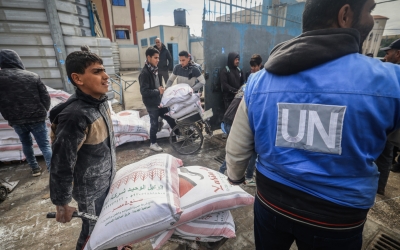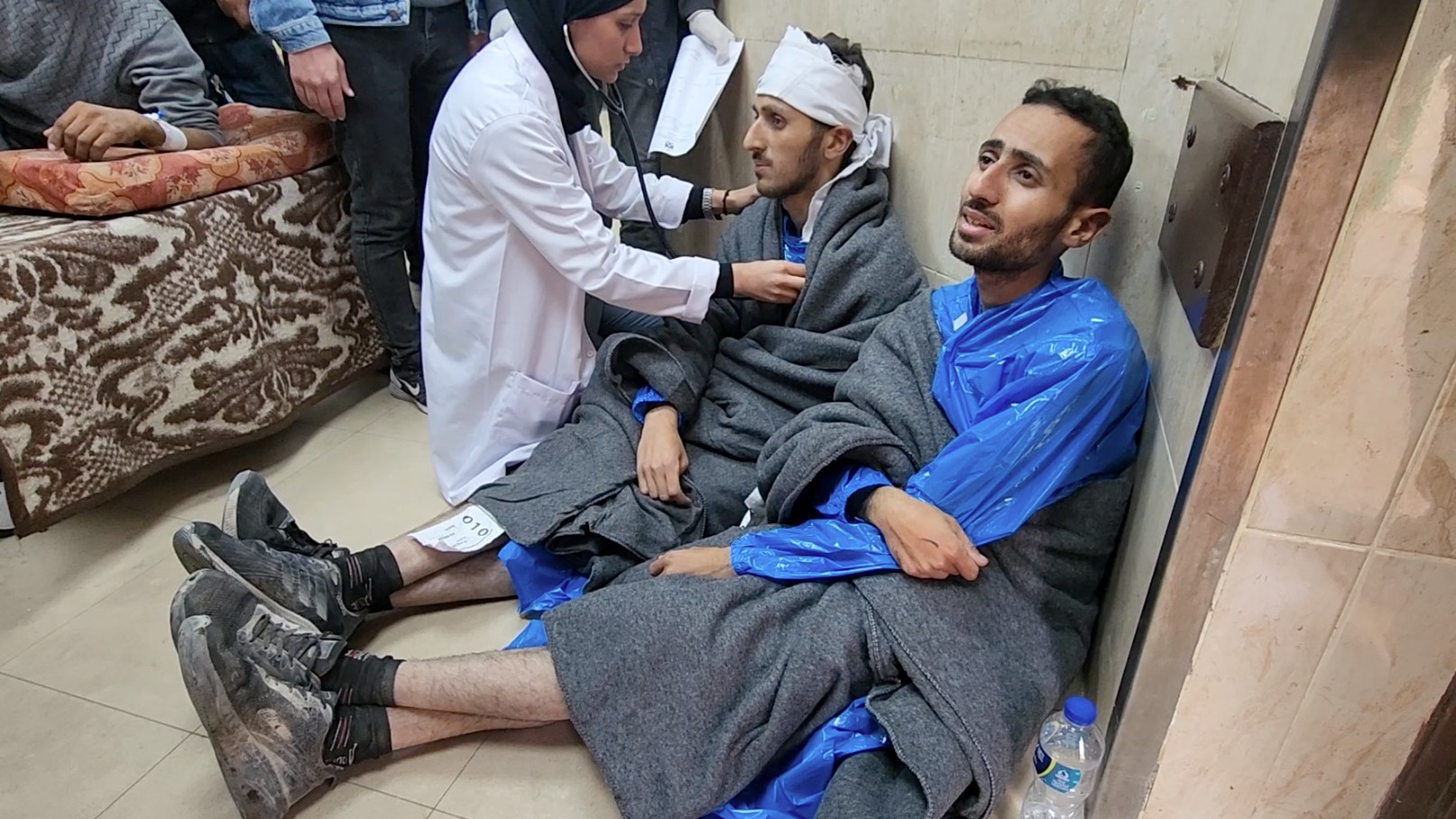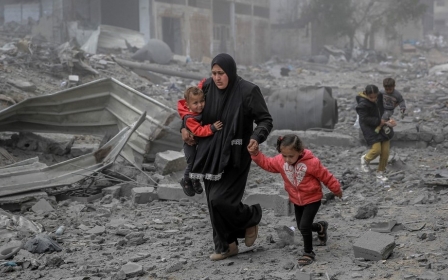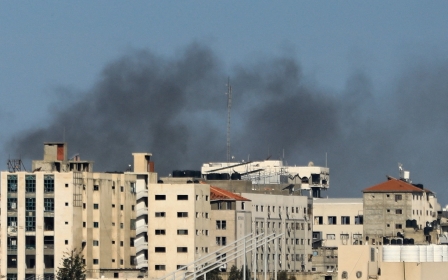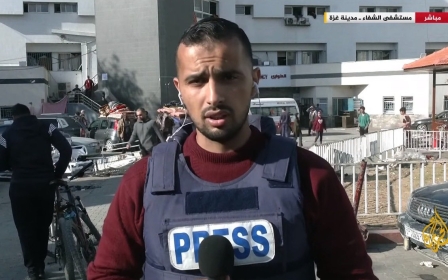War on Gaza: How Israeli soldiers assaulted Palestinians during the raid on al-Shifa hospital
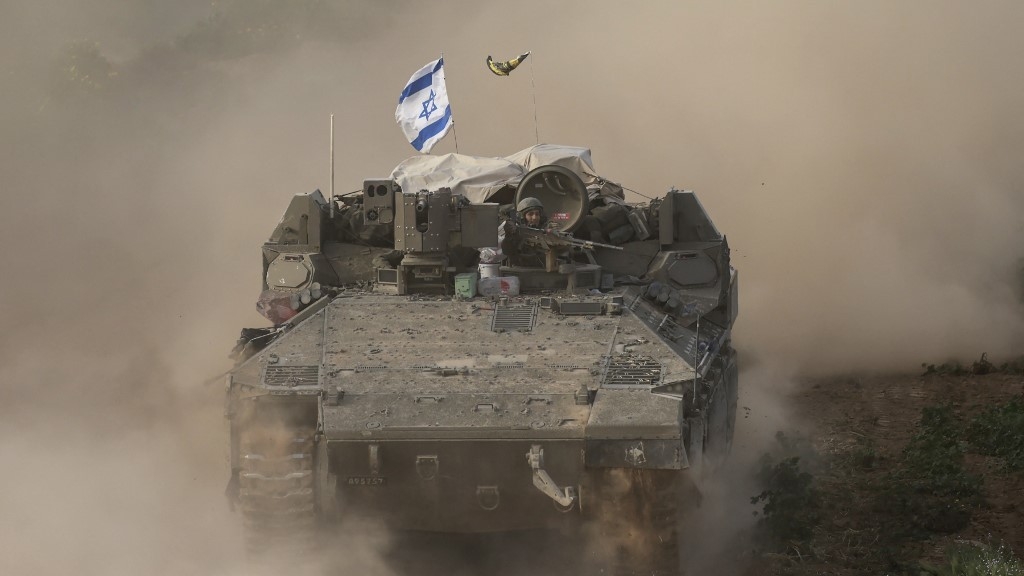
Survivors of the Israeli attack on al-Shifa hospital and its vicinity in Gaza City have recounted their experiences to Middle East Eye, a week after the raid.
Israeli forces have been attacking and laying siege to al-Shifa hospital since Monday 18 March. The medical complex is the largest in the Gaza Strip, with some 30,000 people seeking refuge there prior to the current raid.
The surgical building was destroyed on Thursday, and many displaced people were forced to leave the medical complex, the largest in the Gaza Strip. Meanwhile, civilians in the vicinity of the hospital have reported being trapped under Israeli fire for days.
The Euro-Med Human Rights Monitor rights group said on Saturday that it documented “a series of crimes systematically committed by Israeli forces” in the area of the hospital in Gaza City over the past week.
The abuses , according to Euro-Med, include extrajudicial executions, communication cutoffs, and intense shelling targeting homes surrounding the medical complex.
New MEE newsletter: Jerusalem Dispatch
Sign up to get the latest insights and analysis on Israel-Palestine, alongside Turkey Unpacked and other MEE newsletters
Adel AbdRabbouh, 29, was an eyewitness to the Israeli attack on the hospital last week as he arrived there to visit his cousins.
At around 11am last Monday, he watched as Israeli quadcopters, tanks, warplanes and military vehicles encircled the hospital.
He said “thousands of bullets” were fired at the hospital, which forced him to stay put as he feared being shot at if he fled the building.
“People were falling [...] like leaves from Israeli bullets; patients were left alone moaning from pain inside; women were calling their children, and children were crying out in panic. That was the scene,” he told Middle East Eye.
Then, AbdRabbouh said that approximately 500 Israeli soldiers stormed the hospital, instructing everyone not to move.
They began apprehending those who could walk and had no life-threatening wounds, he added.
“Initially assuring us no harm would come, they proceeded to kill at least 300 civilians. We were mere toys in their hands," he said.
Despite sustaining severe fractures and burns on his left leg during the attack, AbdRabbouh was among those detained in the raid.
Over 500 individuals, including women and children, were also detained, he told MEE.
“Men were stripped, beaten, blindfolded and handcuffed. We were herded into the courtyard and later subjected to interrogation,” he added.
AbdRabbouh said he underwent three rounds of questioning by Israeli soldiers, each round lasting 15 minutes.
Soldiers asked him whether he had encountered any Palestinian fighters. Following 45 minutes of interrogation per person, they were left naked outside the hospital, and received nothing for iftar except a small bottle of water.
They remained in this state until the following morning when they were instructed to march to Al-Rasheed Street, near Istanbul Cafe. On Wednesday morning, they were released and ordered to flee south.
“Despite our exhaustion, wounds, and dehydration, we had to trek for seven hours to Deir al-Balah. I arrived there on the brink of death," he recounted.
'Extreme hunger'
AbdRabbouh's brother, Abdul Rahman, was among the detainees who fled south. He recalled their two-day ordeal, saying they faced “extreme hunger” until they reached the south.
"If anyone dared to request water, they were shot in the legs. We faced extreme hunger for two days.”
He added that he witnessed an eight-year-old boy being shot in the leg by an Israeli soldier after requesting to see his family.
He said Israeli soldiers subjected them to “abuse, beatings, and dehumanising treatment”.
'The Israeli soldiers behaved like monsters'
- Abdul Rahman AbdRabbouh
“The Israeli soldiers behaved like monsters,” he said.
“I consider myself fortunate to have found my brother and escaped with him to the south. The uncertainty of whether we would be executed or spared was the most agonising aspect of our ordeal. I will need many years to recover from this traumatic experience," he added, holding back tears.
Another survivor, Mohammed, who gave only his first name, was in his house near al-Shifa when the raid took place in the early hours of 18 March.
He said he and his children were asleep when the attack started.
“We tried to leave the house but found a tank immediately outside our door and a military bulldozer was razing our neighbour's home,” he told MEE.
They all sat in one room under the loud sounds of artillery shelling and air strikes. The wall of one of the rooms then fell over from the shelling so they had to hide in another room.
“My children were very scared and I didn’t know what to do. I crawled to the kitchen to get them some food. I managed to get to some loaves of bread and the nine of us in the house shared them. I kept trying to reassure my children to go back to sleep every time they woke up from the shelling.”
In the morning, Israeli soldiers broke through the door and stormed the house.
“They stripped me and my brother down to our underwear and moved my wife and children downstairs after taking away her phone. My children were begging the soldiers to take me with them but they refused. They pushed my daughter to the floor and told her to go with her mother.”
After his wife and children left, Mohammed and his brother were blindfolded, their wrists zip-tied, and then they were left in the street in the cold weather. “When I asked for a bag to cover me, they hit me. They kept beating us and verbally abusing us.”
Then the soldiers took the two brothers along with other men to al-Shifa hospital. Mohammed said they couldn’t see anything the whole time, but could hear the soldiers beating other men.
“They took some of the men to another room and then we heard gunshots. The soldiers returned from that room without the men they took with them.”
“We realised that they executed them so we sat there just waiting for our turn.”
“We stayed like this for two days. No water, food or covers. After two days they scanned our faces and finally told us we could go. We walked between tanks and gunfire to safety.”
Broken glass
Mohammed Mershed and his brother were detained from their home near al-Shifa after it was shelled.
“We were crying for help. The soldiers took us from our house and handcuffed us from the back. They forced us to lie down on broken glass," he told MEE on Monday at Deir el-Balah's al-Aqsa Martyrs Hospital.
"We were left there for three days in the cold. The first day my mother and sisters and children stayed with us. Then they took them away.”
“They didn't ask for our IDs or carry out any interrogation when they detained us. They were just playing.”
“I witnessed field executions. It was horrific, It's too painful to remember.”
The Israeli military has announced that it has killed and detained dozens of Palestinians during the ongoing raid. It claimed that those killed were fighters, and those arrested were suspected members of Hamas. The army, however, did not provide any evidence to support those claims.
Al-Shifa and its surroundings have been raided at least four times since the start of the war on 7 October, according to the Palestinian health ministry.
Israel has repeatedly accused Hamas of operating inside hospitals - a charge which the Palestinian group has consistently denied.
Hamas said in a statement last week: "The continued Israeli aggression against al-Shifa Hospital is an attempt to cover up its failure to achieve its military goals."
The Israeli onslaught on Gaza has so far killed more than 32,000 Palestinians, according to the health ministry. More than 70,000 Palestinians have also been wounded during the hostilities that began on 7 October.
This article is available in French on Middle East Eye French edition.
Middle East Eye delivers independent and unrivalled coverage and analysis of the Middle East, North Africa and beyond. To learn more about republishing this content and the associated fees, please fill out this form. More about MEE can be found here.


